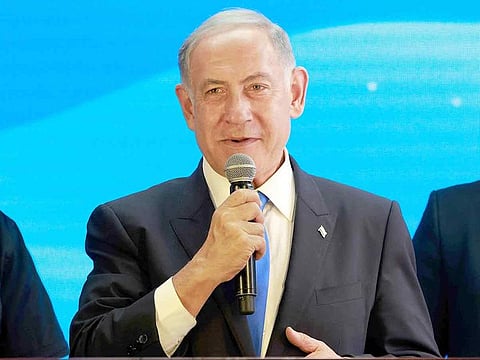Israel's Benjamin Netanyahu makes pre-election pitch with memoir
The 650-page autobiography has not generated major headlines in Israel or abroad

Jerusalem: Former Israeli premier Benjamin Netanyahu released his memoir Tuesday, reaffirming an ambition to return to power in the coming elections and retracing his up-and-down relations with US presidents.
Netanyahu, also commonly known as Bibi, is Israel's longest-serving prime minister, with a first term from 1996 to 1999 and an unprecedented 12-year stretch until 2021.
In "Bibi: My Story", the 72-year-old politician said he will be "forever grateful" for the time in opposition that allowed him to complete his memoir, since a motley coalition of parties ousted him but failed to last its term.
Published just two weeks before Israelis go to the polls, the 650-page autobiography has not generated major headlines in Israel or abroad, lacking bombshell revelations offered in some politicians' memoirs.
But it does contain fresh barbs at former US president Barack Obama, with whom Netanyahu had notoriously fraught relations.
Following his first meeting with Obama in 2007 - when the then US senator was running for president - Netanyahu wrote that he had optimism about their prospective future relationship.
"I can work with that guy," he recalled telling an aide, before both men took power in 2009.
But his view soon changed, in part blaming Obama's "tendency to view the world through an anticolonialist prism" and wrongly, according to Netanyahu, viewing Israel as a colonial aggressor against the Palestinians.
'Great ally' Trump
When Obama left office in 2016 and the presidency was won by Donald Trump, Netanyahu was confident that their policies would align.
"I realised that I would now have a great ally in my battle against Israel's greatest foe," Netanyahu wrote, referring to Iran and Trump's opposition to the 2015 nuclear deal negotiated by the Obama administration.
Trump went on to announce a series of policy shifts welcomed by Israel, notably his recognition of Jerusalem as its capital, which overturned international norms.
The Palestinians cut ties with Washington over what they viewed as its egregious bias towards Israel.
Netanyahu in his memoir also boasted an influence over domestic politics in the United States.
"I knew that Trump would come to appreciate the great support Israel and I had in the evangelical community, the most important element of his political base," Netanyahu wrote.
Israel's November 1 election is its fifth in less than four years.
It could oust Prime Minister Yair Lapid, a centrist, and see the return of the hawkish Netanyahu - but polls indicate that another inconclusive result remains possible.



